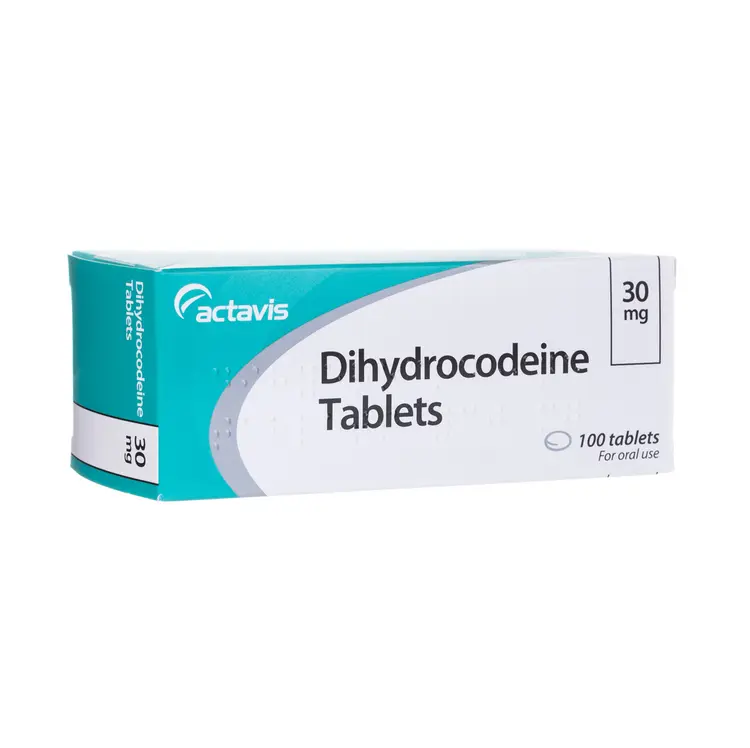Dihydrocodeine 30mg
£100.00 – £347.00Price range: £100.00 through £347.00
buy dihydrocodeine online uk is an opiate painkiller a Class B controlled drug use to treat acute moderate to severe pain including headaches and joint pain
Buy dihydrocodeine online
buy dihydrocodeine online uk is an opiate painkiller and a Class B controlled drug (BNF, 2023). It is a controlled substance currently controlled under the misuse of drugs legislation including both the Misuse of Drugs Act 1971 and the Misuse of Drugs Regulations 2001, in the United Kingdom (GOV.UK, 2022).
Dihydrocodeine can be mixed with paracetamol in certain preparations such as co-dydramol Dihydrocodeine is an opiate that can be used to treat acute moderate pain to severe pain including: migraines, headaches, joint pain and muscle pain, toothache and period pain (NHS, 2023).
- Both short acting and sustained release dihydrocodeine is available
- Dihydrocodeine is a opioid medicine that is sometimes known by its trade names DHC Continus and DF118 Forte
- Dihydrocodeine tablets are an oral morphine derivative of moderate potency (Flecknell, P.; 2016)
- It is important to read the patient leaflet for a full list of adverse effects and cautions.
Google Web Story – A-Z Guide to Dihydrocodeine
painsdrug have put together a Google Web Story called an ‘A-Z Guide to Dihydrocodeine’ to breakdown all terminology related to the opioid painkiller medication. You can view it below:
How Does Dihydrocodeine Work?
Dihydrocodeine is a semi-synthetic form of opioid pain relief. It works by blocking the pain signals from the central nervous system and the brain that are sent from the area of pain, by binding to opioid receptors (Buckle, J., 2015). This means that your sensation of the pain is either reduced or eliminated (NHS, 2022).
Dihydrocodeine use does not treat the cause of the pain, but it may help you to feel more comfortable whilst recovering from an injury or operation.
Minimising pain is helpful for recovery. If you are mobile then your risk of a post-operative blood clot will be reduced. You may also be able to cough more comfortably to prevent a chest infection after an operation.
How is Dihydrocodeine taken?
Dihydrocodeine Tablets
buy Dihydrocodeine online is available as a tablet or liquid. The tablets should be swallowed with water.
It is advisable to take dihydrocodeine with a meal or snack, as this may reduce the risk of side effects including nausea or vomiting and headache.
What is the correct dosage of Dihydrocodeine?
A common oral administration dose of standard release dihydrocodeine tablet is 30 mg tablets taken every 4 to 6 hours. The maximum dose across 24 hours is 180mg. Standard dihydrocodeine takes around two hours to begin working fully (NHS, 2022).
A slow release tablet is also available. The dose of dihydrocodeine begins working more slowly, but has a long term pain-relieving effect. This means the tablets can be taken less frequently. The usual dose of slow release dihydrocodeine is 60 mg to 120 mg tablet taken twice a day
What are the side effects of Dihydrocodeine?
Like all medications, dihydrocodeine can have some side effects.
Dihydrocodeine Side Effects
The most common side effects include:
- Constipation
- Nausea or vomiting (feeling sick or being sick)
- Headaches
- Feeling sleepy
- Confusion
- Feeling dizzy
- Dry mouth.
If these side effects don’t settle or are troublesome, speak to a healthcare professional for advice.
Rarely, serious side effects can occur when taking dihydrocodeine. These include:
- Feeling dizzy or tired due to low blood pressure
- Stiff muscles.
You should speak to a doctor or pharmacist if these side effects occur.
You should call 999 if you have a seizure or fit, or if you have difficulty breathing when taking dihydrocodeine.
If you have a severe allergic reaction (anaphylaxis) including breathlessness, lip or tongue swelling, call 999 immediately.
Dihydrocodeine may not be suitable for everyone. You should tell your doctor or pharmacist if you have:
- Inflammatory bowel disease such as Crohn’s disease or ulcerative colitis
- Irritable bowel syndrome
- Lung disease including asthma
- Liver or kidney disease
- A head injury
- Seizures or fits
- Thyroid disease
- Myasthenia gravis
- Galactose intolerance
- Obstructive sleep apnoea
- Alcohol or drug addiction
Dihydrocodeine may not be suitable during pregnancy, if you are trying to conceive, or breastfeeding. Always consult your doctor prior to starting treatment to ensure it’s safety.
Some prescription medications can interact with dihydrocodeine. You may be advised that dihydrocodeine will not suit you if you already take:
- A painkiller that contains codeine
- Sleeping tablets
- Anti-sickness medications
- Allergy medications
- Anxiety medications.
You should also tell your prescriber about any herbal remedies or supplements you take. This will allow your prescriber to check that dihydrocodeine will not interact with them.
It is important that your doctor checks that dihydrocodeine will suit you. Your doctor should complete a thorough health questionnaire and review your current medications before prescribing this medication.
| Quantity | 100 Tablets, 200 Tablets, 300 Tablets, 400 Tablets, 500 Tablets |
|---|


Reviews
There are no reviews yet.